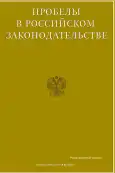Контроль за условно-досрочно освобожденными осужденными как вид государственного контроля: понятие и признаки
- Авторы: Головастова Ю.А.1,2,3, Пашкова Е.Н.4
-
Учреждения:
- Академия ФСИН России
- «Московский университет имени С.Ю. Витте»
- НИИ ФСИН России
- Академия права и управления ФСИН России (АПУ ФСИН России)
- Выпуск: Том 16, № 3 (2023)
- Страницы: 149-157
- Раздел: Уголовно-правовые науки
- URL: https://journals.eco-vector.com/2072-3164/article/view/568806
- EDN: https://elibrary.ru/FPZXQS
- ID: 568806
Цитировать
Аннотация
В статье рассматриваются контроль за условно-досрочно освобожденными, его основные признаки и понятие с точки зрения одного из видов государственного контроля. Целью исследования является выделение системы самостоятельных признаков контроля за условно-досрочно освобожденными осужденными, исходя из которых формулируется авторское концептуальное определение контроля за условно-досрочно освобожденными. Выводы. В результате проведенного исследования автор приходит к тому, что государственный контроль имеет ряд особых признаков, которые существенно отличают его от надзора. Так, среди особых признаков государственного контроля автором выделяются: строгая правовая регламентация правоотношений, субъект, наделенный властными полномочиями, взаимные субъективные права и обязанности, возможность привлечения к ответственности. С учетом приведенных признаков автор приходит к мнению, что контроль за такой категорией как условно-досрочно освобожденные осужденные является одним из видов государственного контроля, обладающим самостоятельными признаками и выделяет их систему. Так, основными признаками контроля за условно-досрочно освобожденными являются: постановление суда об условно-досрочном освобождении, вступившее в законную силу, как основание возникновения контроля; осуществление контроля в строго регламентированной процессуальной форме; субъект контроля – специализированный государственный орган, осуществляющий контроль за условно-досрочно освобожденными осужденными; объект контроля – поведение условно-досрочно освобожденного осужденного; пределы существования контроля за условно-досрочно освобожденным лицом. В рамках данного исследования автором предпринимается попытка сформулировать авторское концептуальное определение «контроль за условно-досрочно освобожденными осужденными».
Полный текст
Об авторах
Юлия Александровна Головастова
Академия ФСИН России; «Московский университет имени С.Ю. Витте»; НИИ ФСИН России
Автор, ответственный за переписку.
Email: ugolovastova@yandex.ru
ORCID iD: 0000-0003-2636-7815
SPIN-код: 7040-1916
д-р юрид. наук, доцент, профессор кафедры уголовно-исполнительного права Академии ФСИН России; профессор кафедры уголовно-правовых и гуманитарных дисциплин Частного образовательного учреждения высшего образования «Московский университет имени С.Ю. Витте»; главный научный сотрудник НИИ ФСИН России
Россия, Рязань; Рязань; МоскваЕкатерина Николаевна Пашкова
Академия права и управления ФСИН России (АПУ ФСИН России)
Email: katipashkova@yandex.ru
адъюнкт, факультет подготовки научных и научно-педагогических кадров
Россия, РязаньСписок литературы
- Абатуров А. И. Постпенитенциарный контроль. Москва: Юрлитинформ, 2013. 224 с.
- Адаменко А. П. Государственные органы как субъекты правоотношений в современной России: автореф. дис. … канд. юрид. наук., Владимир. 2005. 23 с.
- Беляев В. П. Контроль и надзор: проблемы разграничения // Актуальные проблемы российского права. 2017. №4 (77). С. 199-205.
- Горшенин А. А. Современные тенденции развития об условно-досрочном освобождении от отбывания наказания // Альманах современной науки и образования. 2009. № 12. С. 35-38.
- Грушин Ф. В. Институт условно-досрочного освобождения от отбывания наказания: некоторые аспекты функционирования // Пенитенциарное право: юридическая теория и правоприменительная практика. 2021. № 1 (27). С. 59-63.
- Клипов С. А. Контроль за лицами, освобожденными из исправительных учреждений, как институт уголовно-исполнительного права // Человек: преступление и наказание. 2011. № 3 (74). С. 63-66.
- Козлов Ю. М. Горизонтальные административно-правовые отношения. М., 1971. 173 с.
- Марков К. В. Государственный контроль. М.: Известия, 2004. 408 с.
- Мяханова А. Н. К вопросу об условно-досрочном освобождении несовершеннолетних // Вестник Бурятского государственного университета. 2010. № 2. С. 130-132.
- Нестерец М. В. Условно-досрочное освобождение из дисциплинарной воинской части и его роль в предупреждении преступлений: дисс. … канд. юрид. наук. Рязань, 2004. 28 с.
- Пилипенко О. А. Условно-досрочное освобождение от наказания: проблемы теории и практики: автореф. дис. … канд. юрид. наук., Ростов-на-Дону, 2009. 32 с.
- Плюснин А. М. Возможные направления развития организации условно-досрочно освобожденных осужденных к лишению свободы в России // Уголовно-исполнительная система: право, экономика, управление. 2006. № 3. С. 8-12.
- Рыбаков А. А. Контроль за лицами, условно-досрочно освобожденными от отбывания наказания: автореф. дис. … канд. юрид. наук., Владимир, 2015. 24 с.
- Сверчков В. В. Пределы условно-досрочного освобождения от отбывания наказания // Российская юстиция. 2002. № 10. С. 49-51.
- Степанов В. В. Об организации контроля за лицами, освобожденными условно-досрочно // Современные разновидности российской и мировой преступности: состояние, тенденции, возможности и перспективы противодействия / Сборник научных трудов под ред. Н. А. Лопашенко. Саратов: Сателлит, 2005. С. 413-414.
- Тарасов А. М. Проблемы законодательного обеспечения государственного контроля // Государство и право. 2004. №10. С. 20-25.
- Урсов А. А. О необходимости постпенитенциарного контроля за лицами, условно-досрочно освобожденными // Вестник Барнаульского юридического института МВД России. 2007. № 12. С. 111-114.
- Филимонов О. В. Посткриминальный контроль (Теоретические основы правового регулирования). Томск: Издательство Томского университета, 1991. 189 с.
- Чуприна Л. В. Особенности режима испытания при условно-досрочном освобождении // Вестник Томского государственного университета. 2010. № 337. С. 127-133.
- Щерба Д. А. Условно-досрочное освобождение от отбывания наказания: вопросы теории и практики: автореф. дис. … канд. юрид. наук., Владивосток, 2007. 23 с.
Дополнительные файлы








